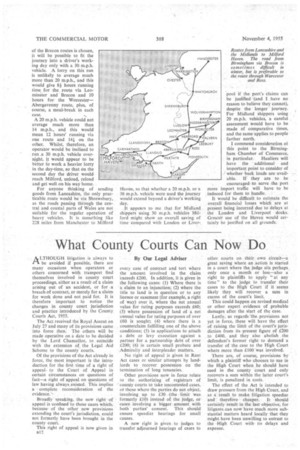What County Courts Can Now Do
Page 38

If you've noticed an error in this article please click here to report it so we can fix it.
By Our Legal Adviser ALTHOUGH litigation is always to be avoided if possible, there are many occasions when operators or others concerned with transport find themselves involved in county court proceedings, either as a result of a claim arising out of an accident, or for . a breach of contract, or merely for a claim for work done and not paid for. It is therefore important to notice the changes in county court jurisdiction and practice introduced by the County Courts Act, 1955.
The Act received the Royal Assent on July 27 and many of its provisions came into force then. The others will be made operative on a date to be decided by the Lord Chancellor, to . coincide with the extension of the Legal Aid Scheme to the county courts.
Of the provisions of the Act already in force, the most important is the intro: duction for the first time of a right of appeal. to the Court of Appeal in certain circumstances on questions of fact—a right of appeal on questions of law having always ,existed. This implies a complete reconsideration of the evidence. 's Broadly speaking, the new right-of appeal is confined to those cases which, because • of the other new provisions extending the court's jurisdiction, could not formerly have been brought in the county court.
This right of appeal is now given in n12
every case of contract and tort where the amount involved in the claim 'exceeds £200. In addition, it is given in the following cases: (I) Where there is a claim to an injunction; (2) where the title to land is in question or to any licence or easement (for example, a right of way) over it, where the net annual value for rating purposes exceeds £60; (3) where possession of land of a net annual value for rating purposes of over £60 is sought; (4) where there is a counterclaim fulfilling one of the above conditions; (5) in applications to attach a debt or levy execution against a partner for a partnership debt of over £200; (6) in certain small probate and Admiralty and interpleader matters.
No right of appeal is given in Rent Act cases or similar attempts by landlords to recover possession on the termination of long tenancies.
Other provisions now in force relate to the authorizing of registrars of -.county courts to take uncontested cases,
• or those where the parties-do not object, involving up to £30 .(the • limit was formerly £10) instead of the judge, or cases involving a bigger amount with • both parties' consent. This should ensure speedier hearings for small causes.
A new right is given to •judges to transfer adjourned hearings of cases to other courts on their own eircuita great saving wheie an .action is started in a court where the judge sits perhaps, only once a month or less—also a right to plaintiffs to apply "at any time" to the judge to transfer their cases to the High Court if it seems likely they will recover a sum in excess of the court's limit.
This could happen on revised medical or other expert evidence of probable damages after the start of the case.
Lastly, as regards the provisions not yet in force, these will have the effect of raising the limit of the court's jurisdiction from its present figure of £200 to £400, and they also abolish the defendant's former rightto demand a transfer of the case to the High Court where more than £140 was involved.
There are, of course, provisions by which a plaintiff who chooses to sue in the High Court when he should have sued in the county court and only recovers a sum within the latter court's limit, is penalized in costs.
The effect of the Act is intended to draw pressure from the High Court, and as a result to make litigation speedier
and., therefore cheaper. It should Certainly result in the last objective, for litigants-can now have much more substantial matters heard locally that 'they Might have been unwilling to entrust to the"High Court withits delays and expense.




















































































